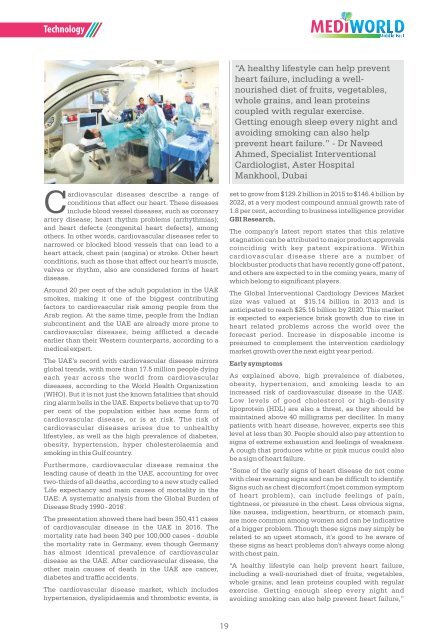Mediworld September-October 2018 LR
Create successful ePaper yourself
Turn your PDF publications into a flip-book with our unique Google optimized e-Paper software.
Technology<br />
“A healthy lifestyle can help prevent<br />
heart failure, including a wellnourished<br />
diet of fruits, vegetables,<br />
whole grains, and lean proteins<br />
coupled with regular exercise.<br />
Getting enough sleep every night and<br />
avoiding smoking can also help<br />
prevent heart failure.” - Dr Naveed<br />
Ahmed, Specialist Interventional<br />
Cardiologist, Aster Hospital<br />
Mankhool, Dubai<br />
Cardiovascular diseases describe a range of<br />
conditions that affect our heart. These diseases<br />
include blood vessel diseases, such as coronary<br />
artery disease; heart rhythm problems (arrhythmias);<br />
and heart defects (congenital heart defects), among<br />
others. In other words, cardiovascular diseases refer to<br />
narrowed or blocked blood vessels that can lead to a<br />
heart attack, chest pain (angina) or stroke. Other heart<br />
conditions, such as those that affect our heart's muscle,<br />
valves or rhythm, also are considered forms of heart<br />
disease.<br />
Around 20 per cent of the adult population in the UAE<br />
smokes, making it one of the biggest contributing<br />
factors to cardiovascular risk among people from the<br />
Arab region. At the same time, people from the Indian<br />
subcontinent and the UAE are already more prone to<br />
cardiovascular diseases, being afflicted a decade<br />
earlier than their Western counterparts, according to a<br />
medical expert.<br />
The UAE's record with cardiovascular disease mirrors<br />
global trends, with more than 17.5 million people dying<br />
each year across the world from cardiovascular<br />
diseases, according to the World Health Organization<br />
(WHO). But it is not just the known fatalities that should<br />
ring alarm bells in the UAE. Experts believe that up to 70<br />
per cent of the population either has some form of<br />
cardiovascular disease, or is at risk. The risk of<br />
cardiovascular diseases arises due to unhealthy<br />
lifestyles, as well as the high prevalence of diabetes,<br />
obesity, hypertension, hyper cholesterolaemia and<br />
smoking in this Gulf country.<br />
Furthermore, cardiovascular disease remains the<br />
leading cause of death in the UAE, accounting for over<br />
two-thirds of all deaths, according to a new study called<br />
'Life expectancy and main causes of mortality in the<br />
UAE: A systematic analysis from the Global Burden of<br />
Disease Study 1990 - 2016'.<br />
The presentation showed there had been 350,411 cases<br />
of cardiovascular disease in the UAE in 2016. The<br />
mortality rate had been 340 per 100,000 cases - double<br />
the mortality rate in Germany, even though Germany<br />
has almost identical prevalence of cardiovascular<br />
disease as the UAE. After cardiovascular disease, the<br />
other main causes of death in the UAE are cancer,<br />
diabetes and traffic accidents.<br />
The cardiovascular disease market, which includes<br />
hypertension, dyslipidaemia and thrombotic events, is<br />
set to grow from $129.2 billion in 2015 to $146.4 billion by<br />
2022, at a very modest compound annual growth rate of<br />
1.8 per cent, according to business intelligence provider<br />
GBI Research.<br />
The company's latest report states that this relative<br />
stagnation can be attributed to major product approvals<br />
coinciding with key patent expirations. Within<br />
cardiovascular disease there are a number of<br />
blockbuster products that have recently gone off patent,<br />
and others are expected to in the coming years, many of<br />
which belong to significant players.<br />
The Global Interventional Cardiology Devices Market<br />
size was valued at $15.14 billion in 2013 and is<br />
anticipated to reach $25.16 billion by 2020. This market<br />
is expected to experience brisk growth due to rise in<br />
heart related problems across the world over the<br />
forecast period. Increase in disposable income is<br />
presumed to complement the intervention cardiology<br />
market growth over the next eight year period.<br />
Early symptoms<br />
As explained above, high prevalence of diabetes,<br />
obesity, hypertension, and smoking leads to an<br />
increased risk of cardiovascular disease in the UAE.<br />
Low levels of good cholesterol or high-density<br />
lipoprotein (HDL) are also a threat, as they should be<br />
maintained above 40 milligrams per deciliter. In many<br />
patients with heart disease, however, experts see this<br />
level at less than 30. People should also pay attention to<br />
signs of extreme exhaustion and feelings of weakness.<br />
A cough that produces white or pink mucus could also<br />
be a sign of heart failure.<br />
“Some of the early signs of heart disease do not come<br />
with clear warning signs and can be difficult to identify.<br />
Signs such as chest discomfort (most common symptom<br />
of heart problem), can include feelings of pain,<br />
tightness, or pressure in the chest. Less obvious signs,<br />
like nausea, indigestion, heartburn, or stomach pain,<br />
are more common among women and can be indicative<br />
of a bigger problem. Though these signs may simply be<br />
related to an upset stomach, it's good to be aware of<br />
these signs as heart problems don't always come along<br />
with chest pain.<br />
“A healthy lifestyle can help prevent heart failure,<br />
including a well-nourished diet of fruits, vegetables,<br />
whole grains, and lean proteins coupled with regular<br />
exercise. Getting enough sleep every night and<br />
avoiding smoking can also help prevent heart failure,”<br />
19

















